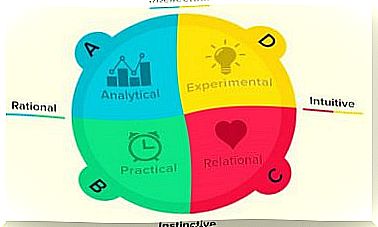When They Say “I Know How You Feel”
When someone says to us “I know how you feel”, this can seem like a nice gesture of empathy. However, from a psychological point of view, it is not always correct. In fact, we cannot imagine the emotional reality the person is going through. So it’s always better to listen and say that she has our full support.
It may sound ironic, but something that happens on many occasions is that we don’t always know how we feel. So when someone tells us they know exactly what we’re going through, it’s not the most appropriate. Not all of us are experts in counseling or skilled in psychological strategies, so these situations often occur on a daily basis.
We also live these situations with those people who are closest to us. Likewise, it is also very common for parents to use this phrase when talking to their children. Saying “I know how you feel” often prevents the child from telling us exactly what is going on in their own words.
Something that we cannot forget is that each person, each human being is a unique universe. Some of them are inhabited by systems in chaos, drifting planets and tiny black holes none of us can reach.
When they tell us “I know how you feel”, they don’t always know
Most people have a bad habit: we tend to assume things rather than ask. This is because we use catchphrases instead of probing each other’s emotional state. In this way, we make less cognitive effort and save time.
For example, when a co-worker says he had a bad day with his partner, we are very likely to say “I know how you feel.” Saying this, we believe that we are generating empathy and connection with the person in front of us. We forget that a person’s emotional makeup will never be similar to ours. No internal reality is like another.
We have a natural inclination to connect, but we don’t always do it the best way.
A study conducted at the University of Virginia by physicians Lane Beckes and James A. Coan demonstrated something interesting. The human brain has a series of neuronal patterns geared solely to connecting with others. We often do this with such intensity that we can feel the same suffering as the person in front of us.
Now, “feeling what the other feels” does not always allow us to accurately understand the other’s personal reality. A mother can grieve for her child and not know what is happening. A friend can grieve for another and still not know what is really happening to him. Hence the importance of knowing how to connect correctly and, above all, respectfully.
What’s the best way to connect with someone who’s going through a bad time?
Whether it’s a child, a teenager, our best friend, an elderly person or a stranger, we should avoid the phrase “I know how you feel” as much as possible. In fact, don’t assume that even in the same situation, two people experience the same emotional realities.
An example: in a study carried out at the University of Geneva by doctors Klaus R. Scherer and Agnes Moors, a very curious experiment was carried out. 3000 adults were asked the same question: how would you feel if you heard two friends talking bad about you?
Well, impressive as it sounds, up to 14 types of emotions have been identified. There were those who felt angry. Others felt shame and disappointment. Some felt guilt, others loneliness, and some said they felt indifference because someone who talks bad about others behind their backs is simply not a friend.
Knowing this, let’s see what alternatives we can use to avoid “I know how you feel”.
Expressive features to replace “I know how you feel”
First, the most important thing is to know how to listen. Let us never forget that certain phrases and words can build walls.
- We should avoid expressions like: this is nothing, I’ve been through this too, you take everything ‘too seriously’, this always happens to you, you need to change your focus, etc.
- Instead of saying “I know how you feel”, substitute “tell me how you feel”.
- Understand that it is not easy to detail or express what we have inside us. Emotions are complex, chaotic and accepting and translating them takes time. Therefore, the other person needs, above all, to feel safe and supported at all times.
Often an “I’m here with you” helps more than any other expression. After all, it’s about being present, about creating a climate of proximity in which we don’t sanction or make judgments, much less position ourselves above the other. Let’s think about it.









